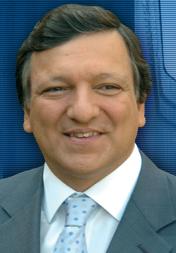Installatie

- José Manuel Barroso (Photo: European Commission)
Het proces van het EU-Parlement om de EU-Commissiepresident en het College van Commissarissen goed te keuren:
- Hoorzittingen van het EU-Parlement van de 10 nieuwe Commissarissen worden verwacht in april 2004.
- This will allow for the formal vote on the enlarged EU Commission shortly after a solemn session at the beginning of May 2004. The solemn session before the EU elections will mark the enlargement of the EU from 15 to the expected 25 members.
- After the elections to the EU Parliament in June 2004, the European Council will nominate its candidate for President of the EU Commission. He or she can then be voted upon in the EU Parliament in late July.
- By the end of August 2004, the names of all candidates for the EU Commission shall be forwarded to the EU Parliament to enable written questioning and oral hearings before the Parliament in September and October.
- The formal vote on the new Commission can then take place in the last week of October to allow the new EU Commission to take office on 1 November 2004 - despite the present Commission's mandate supposedly not ending until 31st December 2004.
The future
The draft Constitution states that the EU Parliament 'elects' the Commission President and then the entire Commission. However, the Euopean Council only gives the Parliament one presidential candidate to chose. If the Parliament refuses to approve the candidate presented by the heads of state and government in the European Council, the European Council may nominate a new candidate. The Parliament cannot force through the parliamentary principle, but only create a crisis in the European cooperation to which the Constitution proposes no solution.
At the EU Summit, an alliance of 17 out of 25 member states must be behind the nomination for Commission President and the team of commissioners.
The question of the appointment is settled by qualified majority voting where the qualified majority represents 2/3 of the member states and 60% of the citizens in the EU.
